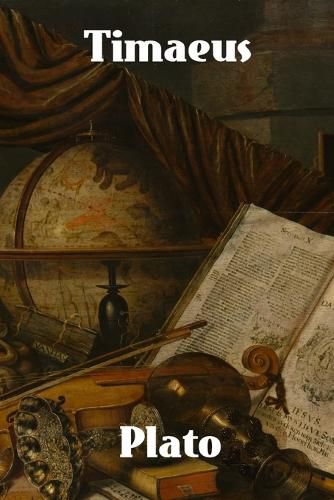Readings Newsletter
Become a Readings Member to make your shopping experience even easier.
Sign in or sign up for free!
You’re not far away from qualifying for FREE standard shipping within Australia
You’ve qualified for FREE standard shipping within Australia
The cart is loading…






This title is printed to order. This book may have been self-published. If so, we cannot guarantee the quality of the content. In the main most books will have gone through the editing process however some may not. We therefore suggest that you be aware of this before ordering this book. If in doubt check either the author or publisher’s details as we are unable to accept any returns unless they are faulty. Please contact us if you have any questions.
Timaeus is one of Plato's dialogues and a philosophy classic, mostly in the form of long monologues given by Critias and Timaeus, written c. 360 BC. The work puts forward reasoning on the possible nature of the physical world and human beings and is followed by the dialogue Critias.
Participants in the dialogue include Socrates, Timaeus, Hermocrates, and Critias. Some scholars believe that it is not the Critias of the Thirty Tyrants who appears in this dialogue, but his grandfather, who is also named Critias. It has been suggested from some traditions (Diogenes Laertius (VIII 85) from Hermippus of Smyrna (3rd century BC) and Timon of Phlius (c. 320 - c. 235 BC) that Timaeus was influenced by a book about Pythagoras, written by Philolaus, although this assertion is generally considered false.
The dialogue takes place the day after Socrates described his ideal state. In Plato's works, such a discussion occurs in the Republic. Socrates feels that his description of the ideal state wasn't sufficient for the purposes of entertainment and that "I would be glad to hear some account of it engaging in transactions with other states" (19b).
Hermocrates wishes to oblige Socrates and mentions that Critias knows just the account (20b) to do so. Critias proceeds to tell the story of Solon's journey to Egypt where he hears the story of Atlantis, and how Athens used to be an ideal state that subsequently waged war against Atlantis (25a). Critias believes that he is getting ahead of himself, and mentions that Timaeus will tell part of the account from the origin of the universe to man.
$9.00 standard shipping within Australia
FREE standard shipping within Australia for orders over $100.00
Express & International shipping calculated at checkout
This title is printed to order. This book may have been self-published. If so, we cannot guarantee the quality of the content. In the main most books will have gone through the editing process however some may not. We therefore suggest that you be aware of this before ordering this book. If in doubt check either the author or publisher’s details as we are unable to accept any returns unless they are faulty. Please contact us if you have any questions.
Timaeus is one of Plato's dialogues and a philosophy classic, mostly in the form of long monologues given by Critias and Timaeus, written c. 360 BC. The work puts forward reasoning on the possible nature of the physical world and human beings and is followed by the dialogue Critias.
Participants in the dialogue include Socrates, Timaeus, Hermocrates, and Critias. Some scholars believe that it is not the Critias of the Thirty Tyrants who appears in this dialogue, but his grandfather, who is also named Critias. It has been suggested from some traditions (Diogenes Laertius (VIII 85) from Hermippus of Smyrna (3rd century BC) and Timon of Phlius (c. 320 - c. 235 BC) that Timaeus was influenced by a book about Pythagoras, written by Philolaus, although this assertion is generally considered false.
The dialogue takes place the day after Socrates described his ideal state. In Plato's works, such a discussion occurs in the Republic. Socrates feels that his description of the ideal state wasn't sufficient for the purposes of entertainment and that "I would be glad to hear some account of it engaging in transactions with other states" (19b).
Hermocrates wishes to oblige Socrates and mentions that Critias knows just the account (20b) to do so. Critias proceeds to tell the story of Solon's journey to Egypt where he hears the story of Atlantis, and how Athens used to be an ideal state that subsequently waged war against Atlantis (25a). Critias believes that he is getting ahead of himself, and mentions that Timaeus will tell part of the account from the origin of the universe to man.